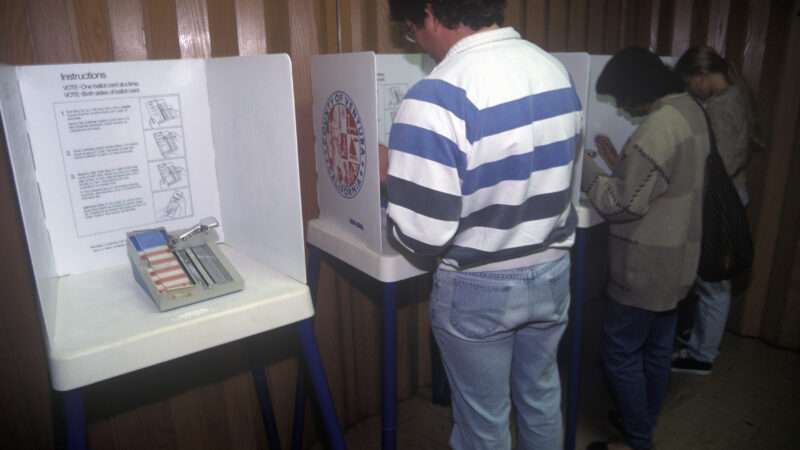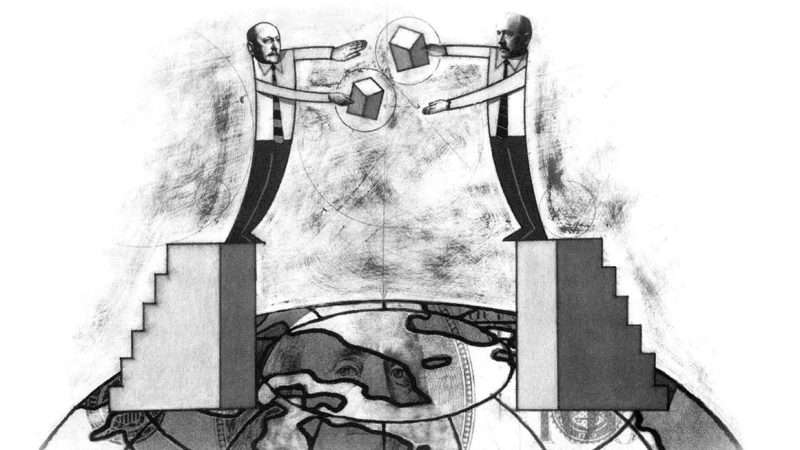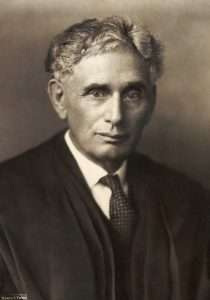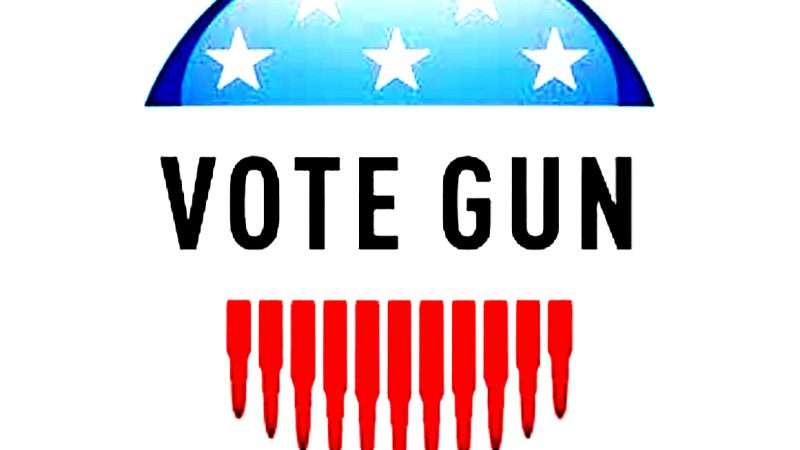1/29/1923: Justice Edward Sanford takes oath.

The post Today in Supreme Court History: January 29, 1923 appeared first on Reason.com.
from Latest https://ift.tt/Zk5tGbY
via IFTTT
another site
1/29/1923: Justice Edward Sanford takes oath.

The post Today in Supreme Court History: January 29, 1923 appeared first on Reason.com.
from Latest https://ift.tt/Zk5tGbY
via IFTTT

Political polarization and the acceleration thereof have been headline-grabbers for years, and the so-called battle of the sexes is of much older vintage. But what happens when you blend the two into a growing partisan divide between men and women? Well, you end up with warnings that the sexes are diverging in their politics, with all that implies—whatever that might be.
“In countries on every continent, an ideological gap has opened up between young men and women,” writes John Burn-Murdoch at the Financial Times. “Tens of millions of people who occupy the same cities, workplaces, classrooms and even homes no longer see eye-to-eye.”
Burn-Murdoch highlights data from South Korea, the U.S., Germany, and the U.K. In each country, women are swerving left while men are tending right. In the U.S., Germany, and the U.K., women’s leftward swing is most pronounced, while in South Korea the larger movement is among men becoming more conservative.
“In the US, Gallup data shows that after decades where the sexes were each spread roughly equally across liberal and conservative world views, women aged 18 to 30 are now 30 percentage points more liberal than their male contemporaries,” notes Burn-Murdoch. “That gap took just six years to open up.”
In the U.S., men’s opinions drifted left about 10 years ago before moving back to the center. The biggest change has been the leftward surge among women, echoed in other countries.
Diverging political opinions between the sexes were called out earlier, by Jean Twenge, who wrote in her 2023 book Generations: “Among liberals, the future is female, and among conservatives, the future is male.”
Twenge’s conclusions were challenged by, among others, Daniel Cox of the American Survey Center. He agreed that young women are trending liberal, but that young men currently look more moderate or politically noncommittal than conservative.
“One important reason the politics of young men is so difficult to pin down is that so few have participated in institutions that shape their values and help them identify their purposes,” Cox added. “Young men may also take longer to define themselves because masculinity itself can be difficult to define in modern culture. It’s frequently treated as a pejorative, but it’s a quality many young men still aspire to.”
With the left, in recent years, harping on “toxic masculinity” while conservatives promote traditional male characteristics, it’s no wonder that attitudes towards masculinity have become predictors of political affiliation in the U.S. But a similar divergence in politics seems to be taking place in other countries.
Alice Evans, a gender researcher and visiting fellow at Stanford University, attributes the political divergence along sexual lines to economic and cultural frustrations, less mixed socializing, and self-aggrandizing “influencers” playing on gender differences for personal gain.
In the West, older men and women tend to have similar views because “they came of age at a time of shared cultural production and mixed gendered socialising,” she writes. “But now – in economically developed and culturally liberal societies – young men and women seem to be growing apart. Evidence points to economic frustrations, social media filter bubbles and cultural entrepreneurs.”
“Failure to address this gap may impede heterosexual love, friendships and family formation,” Evans cautions. She suggests the divide might be bridged by growing prosperity, bursting social-media bubbles, and cross-gender friendships.
Cultural attitudes and economic shifts are very real and can certainly drive resentment as some groups lose status or are flat-out denigrated. Psychologist Helen Smith wrote the 2014 book, Men on Strike, about male reactions to a “system that seems to be increasingly stacked against them.”
Segregated communities also tend to be self-reinforcing. We’ve seen that as Republicans/conservatives and Democrats/liberals geographically relocate themselves to like-minded communities where people share the same viewpoints.
“America is growing more geographically polarized — red ZIP codes are getting redder and blue ZIP codes are becoming bluer. People appear to be sorting,” NPR noted in 2022.
“Groups of like-minded people tend to become more extreme over time in the way that they’re like-minded,” commented Bill Bishop, who wrote about the phenomenon in 2008’s The Big Sort.
If young men and women aren’t socializing together to the same extent as their parents and grandparents, but are discussing politics and other important issues in separate communities, they may drive already conflicting views farther apart.
But how far apart are men and women, really? It’s one thing to say that women are veering to the left and men to the right, but what does that mean? The answer is: It sort of depends.
Ohio State political scientist Tom Wood found that, when you compare answers to questions on specific policies such as gun control, abortion, and taxes, women do indeed come off as more to the left than men. But when you compare the differences in the answers, as Jan Zilinsky of the Technical University of Munich did, on most issues the policy gap isn’t that big.
Are policy preferences more important than political tribe identity? That’s something of an open question, though recent experience in the U.S. suggests that tribal identity is very important. Burn-Murdoch of the Financial Times points to diverging voting patterns between men and women, which can have big consequences no matter what people prefer on specific issues.
“It would be easy to say this is all a phase that will pass, but the ideology gaps are only growing, and data shows that people’s formative political experiences are hard to shake off,” adds Burn-Murdoch.
At a moment when political differences already seep into everyday life and ruin everything, perhaps we shouldn’t be surprised that relations between the sexes are also falling victim.
The post The Battle of the Sexes Turns Political appeared first on Reason.com.
from Latest https://ift.tt/MeatHEN
via IFTTT

December, the public research firm WPA Intelligence came out with a small survey with potentially huge—and widely ignored—implications for institutional media, entertainment, and government.
Asking 1,000 registered voters which of eight listed media personalities they trusted, the firm found podcast iconoclast Joe Rogan—who has been serially singled out by the Joe Biden White House for COVID-19 “misinformation”—in second place with 36 percent, just edging out former Fox News host Tucker Carlson’s 35 percent and Daily Wire impresario Ben Shapiro’s 33, and far ahead of the industry-respected CNN anchor Jake Tapper (23 percent).
In first place, with 40 percent, including the highest ratings of the group among political independents? Comedian Bill Maher.
Maher, whose 22nd season of HBO’s Real Time debuted January 19, the day before his 68th birthday, finds himself in an unusually important position in American discourse as he enters a 30th consecutive year hosting a political talk show on TV. As elite journalists increasingly shy away from “platforming” allegedly dangerous conservatives, Maher eagerly slings the bull with the Steve Bannons and Vivek Ramaswamys of the world. As late-night comedians elicit “clapter” for their dutiful swipes at Donald Trump, the HBO host still aims for actual laughs, in part by making his own political side uncomfortable. And in an era when both left and right are abandoning bedrock Enlightenment values of due process and free speech, Maher has become one of the most insistent (critics would say hectoring) voices for old-school liberalism.
“It’s a small band of us,” Maher says at the Beverly Hills Hotel’s famed Polo Lounge, “but we’re the ones who haven’t gone insane, and people know it.”
Maher is stubborn, tolerant, energetic, and a tad eccentric. He brought a dropper of organic water flavoring to lunch, explaining: “Am I a chemist? Have I vetted it? No, but I really believe them. And Aaron Rodgers texted me and said he’s doing it.” Over the decades he has been one the most influential public figures to normalize the recreational use of marijuana, sitting on the advisory board of the National Organization for the Reform of Marijuana Laws (NORML). Twice during the 2023 Writers Guild strike he came close to breaking ranks and bringing his show back sans writers, as he had in 2008.
As a potentially insane 2024 election year wheezes into gear, Maher is calling for Biden to step down, gearing up for a comedy tour titled “WTF?” releasing a book collecting his editorials over the past two decades, and continuing his popular new video podcast Club Random, where he gets high with celebrities and tries not to talk about politics.
Reason‘s Matt Welch sat down with Maher on January 5 to talk about his career, the state of free speech, and wrestling with such characters as Kanye West.
Reason: How often are you stoned on Club Random?
Maher: Oh, constantly. The whole point of the show is I’m completely stoned. And I’m not hiding it.
Who’s the best stoned interviewee? Who has just lost it so far?
Probably Kanye, but we never aired that one.
You’re suppressing sweet Kanye material!
Oh, I would’ve been canceled. I mean, I try to resist bending the knee—I think I do it better than almost anybody else in media—to the woke shit, but sometimes, you know, you will just be canceled.
We did that right around when he was first starting ranting about the Jews. I wanted to have him over to instruct him, in a nice way. Everybody else was yelling at him, and that’s not the way to get through to somebody. And he’s a sweet guy—I mean, he’s not a terrible guy. He is a narcissist in the sense of the last thing he would ever think to say to me was, “What’s going on with you?”
But I did, I think, get through to him about antisemitism. I don’t know if it stuck. Apparently it didn’t, because he said things since like “I like Hitler,” so.
He was on time, very normal. I think he had been thrown off social media, so he had no outlet and he wanted to go to a few places and get his story out. And he was cool; we laughed our asses off for a couple hours and smoked a lot. And I tried to explain to him about people who are successful in business—you know, that’s capitalism. They’re going to be rough in business. It’s just capitalism, and Jews are good at it, so maybe that’s why you’re beefing so much about it.
But it was still risqué enough that you didn’t want to—
No, it wasn’t just that I didn’t want to get canceled. It was that I thought giving him, with the level of his antisemitism, more oxygen—no, I didn’t want to participate in that. I was hoping I could get him to recant, basically, and I could not. I got him to listen, and then we’d go onto something else and laugh and laugh and laugh, and then it would just sort of like come back again, and he would say something. I’d be like, “Now Kanye, OK, there’s that Jew thing again!” So I thought I had a noble purpose, but then when it did not come around to what I hoped: No, I’m not going to help him. That’s just a bridge too far.
I want to talk a bit about the program that you do on television and look on its history, because you’re in year 30 of doing political comedy.
Thirty consecutive years on TV: That’s a lot! It’s amazing that it gets no coverage in the mainstream media. Really, that’s not a story? I know I’m a bad person because I don’t bend a knee to the woke doctrine, but wow, that’s a lot to look past.
I don’t know, in your age and decrepitude, whether you remember where your memory was 30 years ago—
It’s not the age, it’s the pot!
But when you were starting [Maher’s previous TV show] Politically Incorrect, and to the extent that you had a mission of what you were doing besides getting laughs and getting ratings and getting renewals, what was that mission? And how has that changed over the years?
Well, it’s in the title, Politically Incorrect. That was not a phrase at the time. But that was really what it is. Political correctness, even in the early ’90s, was starting to be out of control.
And also funny to make fun of.
Exactly. I mean, it was a nice barn to throw stuff at; you couldn’t miss if you were honest about it. It was a zeitgeist, a feeling in the culture that the political correctness was going too far. And I thought maybe I could put a stake in its heart. And of course, just like the Kanye thing, completely failed, because it only metastasized and got worse. Incredibly worse.
I remember when I started editing Reason in 2008, the phrase and the concept of political correctness felt like a ’90s thing. Your show came out. Comedy Central was very much in the thick of it; the South Park guys came out right around then. And even some of the early online media felt a little post-partisan, like Salon.com had David Horowitz and Camille Paglia writing as columnists.
The Huffington Post!
Right? When Arianna was still almost a right-winger.
Yes. And I was very, I wouldn’t say involved on an official level, but she was a very, very—and still is a very, very—close friend. And I think it was Andrew Breitbart, he’s a byword now for ultra-conservative, he was one of her friends and was on the project. So, come on, man. I mean, when they say, you know, “You’ve changed.” I’ve changed? Come on. Things change.
So I was talking early in my editorhood to Greg Lukianoff from [the free speech and civil liberties advocacy organization] FIRE, who you had on recently. Back then FIRE was still just doing campus stuff and hadn’t expanded.
Yeah, there’s a little cadre of you guys—you and him and Bari [Weiss] and Andrew Sullivan, who are just so great that you exist in this culture, because it’s a small band of us, but we’re the ones who haven’t gone insane, and people know it.
In talking with Greg in those days, they’d been tracking this stuff on campus, and I was like, “OK you guys are fighting in education, but didn’t we win the politically correct wars in the ’90s?” And he’s like, “You are so wrong about that.” It’s just that we stopped talking about it as a country, but meanwhile all the institutions got totally infected.
They really did. And that’s how you wound up with college campuses being Team Hamas. “Hey liberals! Let’s get behind the most illiberal people in the world! Let’s get with the people who put a bag over women’s heads and make them have a male guardian if they want to leave the house.” I could never have predicted it. So insane.
Since you have more proximity to and grounding in the left of the center of the median, do you have a working theory of what the hell happened?
That’s a great question. I mean, I know there are people who think that it’s a deliberate communist infiltration; that I find hard to believe. But I do think it starts with stuff in the universities. As I called it in an editorial recently, that’s the mouth of the river from which all the nonsense comes. Which is how we saw what we saw post–October 7 on the campuses, and the Harvard president resigning, and so forth.
I was recently remembering the Ari Fleischer quote, where he was asked about your comment not long after September 11 about the comparative cowardliness of Americans sending bombs from afar. His response when asked, “What do you say to Bill Maher’s quote,” was, “Americans have to watch what they say.” Which was not great! It was not great for the spokesman of the president of the United States to say that as a general thing, or even as a specific thing.
Everybody on the left was on my side. As they should be. And that should pertain to both sides, left and right. It was wrong when someone from the right said, “Americans should watch what they say,” but who are we really watching what we say for now, more than anybody? The left. That’s who you have to watch what you say around.
Look, it’s not like cancel culture doesn’t exist on the right. I’ve pointed out before: Nobody got canceled harder than Colin Kaepernick. OK? So it happens both ways. But it’s more of a left thing. People are much more afraid. Obviously people in the public eye even more so, but even just around the office, people are worried: “I have a thought; just safer not to say it.” And that’s a bad place to be.
I referenced the Ari Fleischer quote on CNN recently, in an amazing segment from a few months ago in reaction to one of these court cases that went against the Biden administration for trying to suppress speech, especially COVID-related health speech and “misinformation.” I sat with a panel of journalists who were all just shaking their damn heads at the judge not allowing the Biden administration to crack down on all these lying misinformation people. As I was saying on CNN, I couldn’t believe that we got to this point where journalists are cheering on the White House engaging in actual censorship, saying from the same podium that Spotify really needs to do more to crack down on Joe Rogan, that there’s a dirty dozen list of people who spread the most misinformation about COVID.
Misinformation. One of the other most weasel fucking words. Whose misinformation? These people—the “science” people—have no idea what science is, that it’s something that’s tested every day. Otherwise it’s religion. What they’re talking about, what they have is a religion. Ridiculous.
I think of the survey that they did about COVID in 2021, where something like almost 50 percent of Democrats thought that if you got COVID, there was a 50 percent chance you would get hospitalized, when it was actually more like 1 percent. Obviously, that tells you something about a media bubble on the left also. I mean, that’s some crazy misinformation. So maybe a quarter of the country, half of the liberal side of the country, is going around with the idea that half the people who get COVID go to the hospital. Of course they’re going to believe in crazy stupid overreaction tactics to deal with this. So nobody has a monopoly on misinformation.
How often do you get accused of “platforming”? When Politically Incorrect started, one of the things that was refreshing about it was that it was a place where people with different points of view about politics could laugh and talk about it as if they were real human beings. I just presumed that everyone would be copying that model, but it seems to have run in the opposite direction now, where just the idea of even a straight-news television program having people who have different political views seems odd.
I had [Ron] DeSantis and Ted Cruz on this year, and Bill Barr. And yes, to answer your question, I can think of two people—and I won’t say who they are; one of them is pretty famous—just yelling at me in an email about that. And my answer to that is: Fuck off. You know what? You live in your ivory tower. I’m going to talk to everybody in the half of the country that you find is so deplorable. They’re not going to self-deport, even if they are deplorable.
And some of them are! And some on the left are deplorable too, and incredibly obnoxious. That’s the country!
When historians look back in a hundred years, if we’re still here, I don’t think they’re going to divide the country like we do into these two camps. They’re going to say: As a people, they were obnoxious. It happens in different forms on both sides. As a people, they didn’t believe in science. On the right, they think global warming is a hoax or whatever nonsense they believe about that. And on the left, they think men can have babies. That’s what they’ll say. They’ll say, “As a people, they just lost their shit.”
Do you have a special sense of either foreboding or humor, even if it’s a little bit mordant, about 2024?
I think I’m where a lot of people are: I wish Biden would step aside. Well, first, I wish Trump doesn’t win, but he totally could, and it’s looking more like he will. But a lot can change in a year. We haven’t had any of his trials—although if the January 6 commission and the media and everything else haven’t changed people’s minds about liking him, I think these trials are only going to make him look like a revolutionary leader. All you have to say is, “The people who put me on trial were corrupt!” And then your ignominious behavior becomes a badge of honor. So whether the trials are going to help or hurt him, it’s hard to say. I think it’ll be about a draw, and then it’ll really be a referendum on which side is crazier.
And both sides have a case, although I always fall on the side of “Trump of course is truly crazy.” He’s stupid and crazy. They’re two completely different things, but he has both of them. I’m even more worried about the crazy side, but crazy photographs, insanity photographs, it’s compelling. And when he shows up, come on, people are going to cover it, watch it. It’s not going to be boring. And in this unfactual society, I don’t think any of the issues really are what most people vote on anyway. It doesn’t really matter what any of them say or do, because they each have their own media sources, who are in the business of feeding back to their audience what they want to hear.
Trump has been so weird for comedy. He’s inherently funny—as a comedian, he’s got really good laugh-out-loud timing. But also as a character, he’s funny. And yet for institutional comedy, for Saturday Night Live comedy, I think he’s been terrible. Why? How did they screw up such an obvious thing?
I must say first, the guy on Saturday Night Live who does him now [James Austin Johnson] is genius at it. So much better than any of the other people who did him. Alec Baldwin’s not an impressionist; he did a passable job, but it was just a vehicle to put stupid words in Trump’s mouth, which, who can’t do that? I mean, I don’t disagree with the spirit of it; it just gets old. But this guy captures what I was saying a minute ago, the insanity. He captures that he is insane, because he talks exactly the way Trump sounds: stream of consciousness, one thought ping-ponging to another one that may or may not be connected. That’s what kills me. That’s the best thing they do on that show.
That’s good. But generally speaking, and not just to single out SNL, late-night comedy overall has, at least for my taste, and maybe you have a different opinion—
Oh, no. I don’t really want to talk about it, because I get in trouble if I start talking about other people doing political comedy on TV. Let’s just say: There’s a place for everybody, and everybody’s super talented, and they’re just doing different things!
But one way that I find there to be this weird separation, is that there’s a demonstrated audience for what you do. There’s an audience for Bari Weiss, Andrew Sullivan, us, people who are doing similar things. And they give us feedback that is similar to the feedback you get as well. And then if you look in the world of comedy, the places where comedy is institutional, they seem to be losing audiences. But the individuals who are out there on Netflix, and who’ve gone solo? The people who don’t give a fuck are out there killing it. Why such a split? Why is it so that the institutions can’t recognize and learn from the people who are killing it?
It’s my mouth-of-the-river theory. The mouth of the river is the elite colleges. Those spoiled kids who go to those elite colleges who do nothing but complain about privilege while they lead the most privileged life possible. They have the ultimate privilege, which is the ability to spout nonsense without any sort of consequence and to believe in impractical things. So that’s who goes to those colleges. It’s a very small world in that world. The same kind of kids who go to the same kind of schools, same kind of neighborhoods they grew up in, go to these colleges. So they’re in this sort of bubble where they’re feeding this stuff to each other.
Who knows where the actual origin is. It’s kind of like AIDS: Was it a monkey? I don’t know. Something like that. Maybe this was a monkey; I don’t know. But then they go into media, so now they have the bullhorn, right? So it’s not a big number of people, but it’s the people who are controlling it.
When I first received your show thousands of years ago, I took it as this new thing, and I’m sure you felt it as a new thing, a new kind of genre. But now I wonder: Was it also maybe the last of an old thing? You ever look at those old Merv Griffin clips, or—
David Susskind?
Exactly. Or Dick Cavett: Let’s just get John Lennon on to talk about crazy shit with someone over here.
Yeah, that’s what I was doing with Politically Incorrect. I was bringing back something. I never claimed I invented the idea of having different people on this show at the same time—talk shows had moved away from that. So it was in a way a renaissance of something from the antiquity of television.
I of course took it to a different level. It was sort of a designed train wreck, that show, right? You were supposed to have Bob Dole on with Carrot Top because the idea was they both get to vote, so they both really have the same power, or whatever. And so that was the charm.
It was also a silly show in many ways, because that often rendered just silliness. But it was a comedy show. First of all, it was a half-hour long minus eight minutes of commercials. We had 22 minutes for four people plus me to talk, minus a monologue. I mean, you couldn’t really get too deep into a lot of issues.
So Real Time comes on. More space, more serious-ish. More explicitly political.
The difference was there wasn’t Carrot Top. And I say that as someone who loves Carrot Top: He’s a super smart guy but not right for sitting on a panel. It’s people like you now. In the old show, we were always trying to have and needed celebrity value. There are some celebrities now, but there are very few, and they are almost never on the panel. This is a team of thinkers.
So 2025, what are you going to do? Do you want to keep doing this?
I’ll probably do it until they kick me out. I can’t think of a better job.
This interview has been condensed and edited for style and clarity.
The post The Last Liberal appeared first on Reason.com.
from Latest https://ift.tt/EIMtO2b
via IFTTT

Alabama’s Jefferson County school system suspended a 6-year-old for pointing his finger like a gun while playing cops and robbers. He initially received a class 3 violation, the same one given to students who bring actual weapons to school, later dropped to a class 2 violation. School officials later told local media that only a “discussion with the student” was needed, and not a suspension, but the boy’s father said the class 2 violation remains on his son’s record.
Milford, Massachusetts, police charged two people with keeping a disorderly home, gaming or betting, keeping a place for registering bets, and selling liquor without permits. According to police, Luis Loja-Caguana paved over the backyard at his home and installed two full volleyball courts, where police say he not only hosted volleyball games but ran a betting operation on the games. Police served a search warrant on the property and seized around $10,000 in cash.
A Maricopa County, Arizona, prosecutor fired for falsely charging protesters as gang members said before a State Bar disciplinary hearing that she did nothing wrong, even when she charged a bystander who was not part of the protest. April Sponsel said she still believes nurse Ryder Collins is part of a gang, despite video evidence from both police officers and bystanders showing Collins did not take part in the protest.
Police in Valence, France, ordered a Chamas Tacos restaurant franchise to turn off its sign or face an administrative closure order because the C in the sign is not working, so at night it appears to read “Hamas Tacos.” The owner of the restaurant told local media that the C has not been working for months, well before the recent attacks on Israel by the terrorist organization Hamas.
Christopher Fujushin of Grantsville, Utah, put up a Halloween decoration of a pole-dancing skeleton outside his house. City officials posted on Facebook that the display, which was attached to a street sign, had to be removed. Fujushin then moved the display to his front yard and added lights, music, and more skeletons. His neighbors donated items to make the display even bigger.
Hachikosela Muchimba, a U.S. Postal Service carrier in Washington, D.C., has been charged with mail theft and bank fraud. Prosecutors said Muchimba stole $1,697,909 in mailed checks, erased the payees’ names, and deposited them in his bank account. In a search of his house, authorities allegedly found an ATM receipt in which Muchimba deposited a Treasury check for $415,173. Prosecutors say he tried to flee to Zambia when discovered.
In England, Northumbria Police fired Constable Philip Aiston after a panel found he failed to notify a couple of the death of their son, as he was told to do, then lied about it for two years. Aiston reported going to deliver the news and finding no one home, but GPS data from his patrol car placed him five miles away from the couple’s residence. The panel found that not notifying the parents didn’t warrant disciplinary action but the multiple lies he told his superiors did.
A proposed Chinese law would ban wearing clothing or symbols that “undermine the spirit or hurt the feelings of the Chinese nation.” Those who violate the law could face up to 15 days in jail and a fine of up to 5,000 yuan ($700). The proposal came after police in Suzhou detained a woman for wearing a Japanese kimono and after people wearing rainbow-print clothing were barred from attending a concert in Beijing.
The post Brickbats: February 2024 appeared first on Reason.com.
from Latest https://ift.tt/bh1Z2j5
via IFTTT

“Civil libertarians have no love for [Immigration and Customs Enforcement] or the surveillance state, but facial recognition technology is likely here to stay. If Amazon won’t sell it to law enforcement, someone else will. Haranguing any one company in hopes that it won’t provide services that are perfectly legal only delays the inevitable, without addressing the fact that we need more oversight over how law enforcement agencies use surveillance technology.”
Declan McCullagh
“Deplatforming Is a Dangerous Game”
“Arrogant, abusive, incompetent, and expensive, the [Transportation Security Administration] is, in the words of the House Appropriations Committee, ‘seemingly unable to make crisp decisions.…unable to work cooperatively with the nation’s airports; and unable to take advantage of the multitude of security-improving and labor-saving technologies available.’ The attacks of September 11, 2001, changed many things, but they did not make the federal government more competent or effective, and they did not make it more willing to respect the dignity or liberty of its citizens.”
James Bovard
“‘Dominate. Intimidate. Control.'”
“The resurgence of anti-Semitism worldwide, fueled largely by the backlash against Israel since the start of the second Palestinian intifada in 2000, has been the subject of much heated discussion. At the heart of the debate is the question: Has criticism of Israeli policies become a vehicle and a cover for anti-Jewish prejudices that are otherwise unspeakable in polite society? Or, conversely, has the charge of anti-Semitism become an all-too-convenient way to silence critics of Israel and of the policies of Ariel Sharon’s government?”
Cathy Young
“Hating Jews”
“We don’t agonize that the country is racing to the bottom because secretaries are replaced by voice mail, or because bank employees are replaced by ATMs. What, then, is so special about the fact that some labor-intensive manufacturing operations are being replaced by Third World factories? All of these trends are part of a larger process: the process of raising productivity, of squeezing more value from less effort. Far from provoking a race to the bottom, this process is the essential precondition for continued increases in our overall standard of living.”
Brink Lindsey
“Fast-Track Impasse”
“Technocracy is by nature hostile to diversity and freedom. Its goal is control—a uniform future shaped by experts. It recognizes only one best way. So it overrides the judgments and desires of individuals, curbing choice, experimentation, and learning in the name of ‘scientific’ wisdom. Now, however, our technocrats aren’t keeping their side of the bargain. They’re destroying not only choice but progress, attacking not only liberty but truth. They have joined forces with those who seek to quash technology, innovation, and ‘unnatural’ inventions—to create a static society by defamation and decree. By attacking the innocent and emboldening the malevolent, spreading rumors and defying their own experts, they have betrayed the public trust.”
Virginia Postrel
“Rumor Mongers”
“Our intellectual roots leave us poorly prepared to analyze the limits to subsidies. The modern Western tradition treats government as a cornucopia, an inexhaustible source of everything that people might need. Government has a bulging treasury of hundreds of billions that it showers in subsidies in every direction. A closer look reveals, of course, that this appearance of wealth is deceptive. Government does not create wealth. It is simply an agency for coercively shifting it about. The helping state is not a complete economic system; it is merely the attractive face of an equal and opposite ‘hurting state,’ a government that day by day inflicts privation upon its citizens, taking their money away from them.”
James Payne
“Where Have All the Dollars Gone?”
“I’m appalled that federal courts say it’s all right for the government to go to the telephone company and check on the phone calls of a news organization without that organization even knowing the check is being made. Do you know what that is? That is the thinking of mentally obsolescent judges who are unable to relate sound old constitutional principles to new technology.”
Bill Monroe
“Unchain the Electronic Media!”
The post Archives: February 2024 appeared first on Reason.com.
from Latest https://ift.tt/hFdCl3k
via IFTTT

The ACLU of Northern California reports it has uncovered a geofence warrant that stretched nearly two miles across San Francisco. The warrant would have allowed law enforcement to find active cellphones across an area that included numerous private homes as well as several government buildings. The ACLU said it isn’t clear what law enforcement agency obtained the warrant or how long it was in effect.
The post Brickbat: Casting a Wide Net appeared first on Reason.com.
from Latest https://ift.tt/s2vOYho
via IFTTT
The post Monday Open Thread appeared first on Reason.com.
from Latest https://ift.tt/zmclHJk
via IFTTT

In the late 1990s, my grandfather bought a mail-order bat box as a natural approach to mosquito management. The dark green plywood roost was mounted on tall wooden poles on a sunny patch in the yard and stabilized with tension wires. The catalog promised that the bats would raise their pups inside the box and feast on the mosquitoes that swarmed my grandparents’ lakefront yard.
The bat box always seemed like an undisputed win for all parties (save the mosquitoes). But when I started researching a bat box for our mosquito-plagued property in North Carolina, I learned that some off-the-shelf boxes, like the kind my grandfather used, are essentially bat ovens. In hot months, artificial roosts that are poorly located, too small, darkly painted, or insufficiently ventilated can reach lethal temperatures, killing bat pups.
This knowledge rattled me, and I suspect it would have deeply upset my grandfather, who took great pride in his environmental stewardship. But this is how science is supposed to work—hypothesize, test, share, tweak, repeat. Sometimes it’s a bummer, but how else can we know if our corrective measures do what we want?
In 2021, several experts debated in the pages of Conservation Science and Practice whether it helped bats to publicize the potential lethality of a bat box. “Telling people their well-intended conservation efforts are wrong is rarely productive,” wrote Virgil Brack Jr. and Dale W. Sparks, principal scientists at Environmental Solutions & Innovations, Inc. The subjects of their critique, Reed D. Crawford and Joy M. O’Keefe of the Department of Natural Resources and Environmental Sciences at the University of Illinois at Urbana-Champaign, replied that they would continue to raise awareness “that the cavalier use of unsuitable boxes could expose bats to deadly temperatures.” Both parties agreed the design and deployment of artificial roosts could and should be improved. Once again, the reckoning is uncomfortable but necessary.
Amateur apiarists are rethinking a few things as well. Once considered the environmentalist equivalent of a victory garden, the European honeybee hives that were established in backyards and rooftops around the U.S. in the early 2010s following reports of “colony collapse” could “actually have a negative influence on native and wild bee populations through floral resource competition and pathogen transmission,” according to research published in 2023 by conservationists at Concordia University and the University of Montreal.
“For people who say they want to save the bees and they have a honeybee hive, it’s kind of like throwing Asian carp into the Great Lakes and saying you want to save the native fish,” York University conservation professor Sheila Colla told The Washington Post in May 2023.
The undesirable effects of good intentions scale up pretty quickly when government policy drives environmental efforts. In August, Science reported that 2020 emissions regulations imposed by the United Nations’ International Maritime Organization had the desired effect of reducing the amount of sulfur that ships released into the air, as well as the undesired effect of simultaneously reducing the volume of sulfur-based clouds, called “ship tracks,” that form along shipping routes and reflect the sun away from the Earth.
“By dramatically reducing the number of ship tracks, the planet has warmed up faster,” explained Science reporter Paul Voosen. “That trend is magnified in the Atlantic, where maritime traffic is particularly dense. In the shipping corridors, the increased light represents a 50% boost to the warming effect of human carbon emissions.”
In China, ambitious government subsidies for green energy projects in the late 2010s spurred an explosion in electric vehicle (E.V.) development that is now readily apparent in the car graveyards around the country where obsolete E.V.s have been abandoned. “Not only are the sites an eyesore,” reported Bloomberg News in 2023, but “getting rid of EVs so quickly reduces their climate benefit considering they’re more emissions-intensive to build and only produce an advantage over combustion cars after a few years.”
There are even policies where personal conservation and governmental environmental policy collide in a spectacularly horrifying fashion. In a September essay titled “We Thought We Were Saving the Planet, but We Were Planting a Time Bomb” in The New York Times, Canadian novelist and essayist Claire Cameron recounted her own personal reckoning with the time she spent planting trees on logging land in Ontario, only to learn years later that her efforts helped fuel forest fires.
“This was a common—if notoriously grueling—rite of passage for Canadian university students, since it allowed you to make good money while spending a few months outdoors with other like-minded young people. I was driven in part by the idealistic view that planting a tree was always going to be better than not planting one.”
Except the trees they were planting were all the same species, water-thirsty and highly flammable, neatly spaced six feet apart. “Much later, I learned that the trees we were planting, black spruce, are so combustible that firefighters call them gas on a stick. The trees evolved to burn: They have flammable sap, and their resin-filled cones open up when heated to drop seeds into charred soil.” To make matters more complicated still, the tree-planting program was managed by private timber companies but driven by government incentives.
For some, these unintended consequences will elicit schadenfreude; for others, despair. But there is a silver lining in these revelations, which is that we learn something new every day, month, and year about what kinds of eco-stewardship produce good results as well as what those results cost. While government bodies are not Bayesian actors, individuals and private firms can be. At the human scale, we can react and adapt to new knowledge, avoid or abandon well-meaning disasters, and make choices that have a positive impact on our local ecology.
In some cases, the best thing you can do for the environment is leave it well enough alone. Bats, it turns out, are naturally drawn to roosting in dead tree trunks. My property is full of them.
The post When Well-Intended Environmentalism Backfires appeared first on Reason.com.
from Latest https://ift.tt/eL5uRYl
via IFTTT
1/28/1916: President Wilson nominates Louis Brandeis to the Supreme Court. He would be confirmed on June 1, 1916.

The post Today in Supreme Court History: January 28, 1916 appeared first on Reason.com.
from Latest https://ift.tt/JgGMzAe
via IFTTT

Vote Gun: How Gun Rights Became Politicized in the United States, by Patrick J. Charles, Columbia University Press, 488 pages, $35
The National Rifle Association (NRA) “favored tighter gun laws” in the 1920s and ’30s, New York Times columnist Nicholas Kristof wrote in 2018. But since the 1970s, Kristof complained, the NRA “has been hijacked by extremist leaders” whose “hard-line resistance” to even the mildest gun control proposals contradicts “their members’ (much more reasonable) views.”
Other NRA critics have told the same story. That widely accepted account, U.S. Air Force historian Patrick J. Charles argues in Vote Gun, is “based more on myth than on substance.” In reality, he shows, the NRA’s fight against gun control dates back to the 1920s. But in waging that battle, the organization tried to project a reasonable image by presenting itself as open to compromise. That P.R. effort, Charles says, is the main source of the erroneous impression that “the NRA was once the chief proponent of firearms controls.”
Charles also aims to debunk the idea that the NRA’s power derives from its ability to mobilize voters against elected officials who defy its wishes. Since it “commandeered the political fight against firearms controls from the United States Revolver Association” a century ago, he says, the NRA has been adept at defeating proposed gun restrictions by encouraging its members to pepper legislators with complaints. While such direct communications tend to make a big impression, Charles argues, they are a misleading measure of the electoral penalty that politicians are apt to suffer by supporting gun control.
Vote Gun—which covers the first eight decades of the 20th century, ending with Ronald Reagan’s election in 1980—presents a wealth of new material to support its main theses. But the book is marred by many small mistakes, which appear on almost every page and typically involve misused, misspelled, misplaced, or missing words. More substantively, Charles is harshly critical of the NRA’s rhetoric and logic but pays little attention to similar weaknesses in the arguments deployed by supporters of gun control.
In his prior work, Charles has portrayed the NRA’s understanding of the Second Amendment as a modern invention. He alludes to that position in Vote Gun when says the “broad individual rights view” accepted by the U.S. Supreme Court is based on “historical sleight of hand.”
Contrary to what the Court has held, Charles thinks the Second Amendment was not originally intended to protect an individual right unrelated to militia service. That idea, according to his 2018 book Armed in America, first emerged in the 19th century. Even then, Charles says, the Second Amendment was seen as consistent with regulations opposed by the contemporary gun rights movement. His lack of sympathy for the idea that the right to armed self-defense should be treated like other civil liberties colors Vote Gun‘s ostensibly neutral account.
***
As early as 1924, NRA Secretary-Treasurer C.B. Lister was declaring that “the anti-gun law can be intelligently viewed only from the standpoint of a public menace.” The organization soon began acting on that attitude by resisting new gun legislation.
Charles argues that the conventional narrative exaggerates the significance of the 1977 NRA convention in Cincinnati, where “hardline gun rights supporters” replaced leaders they perceived as insufficiently zealous in protecting the Second Amendment. “Many academics,” he says, see that development as “a gun rights revolution of sorts—one that forever transformed the NRA from a politically moderate sporting, hunting, and conservation organization into an extreme, no-compromise lobbying arm.” That view, he suggests, is belied by the NRA’s prior five decades of lobbying against gun restrictions and its explicit adoption of a “no compromise” stance seven years earlier.
Here Charles’ sloppy writing obscures his meaning. “This is not to say that the Cincinnati Revolt is insignificant in the pantheon of gun rights history,” he writes. “It most certainly is.” He presumably means that it is not insignificant. That’s just one of numerous errors that would have been caught by any reasonably careful editor or proofreader. Although generally minor, they sometimes raise questions about the book’s sources.
According to Charles, for instance, a member survey that the NRA conducted in 1975 included this question: “Do you believe your local police need to carry firearms to arrest and murder suspects?” We can surmise that the word and, which radically changes the meaning of the question, was included accidentally. But it’s not clear whether the accident should be attributed to Charles or the NRA.
Despite such puzzles, Charles is on firm ground in arguing that the NRA has frequently portrayed even relatively modest regulations as the first step toward mass disarmament. But he also shows the NRA has blocked policies that would have substantially limited the right to keep and bear arms. Charles seems loath to acknowledge that such proposals lent credence to the NRA’s warnings.
The National Firearms Act of 1934, for example, originally would have covered handguns as well as machine guns and short-barreled rifles. The law required registration of those weapons and imposed a $200 tax on transfers, which was designed to be prohibitive, amounting to about $4,600 in current dollars. Had Congress enacted the original version of that bill, possession of what the Supreme Court would later describe as “the quintessential self-defense weapon” would have been sharply restricted.
More generally, Charles depicts the NRA’s concerns about gun registration as overblown, verging on paranoia. But while registration is not necessarily a prelude to prohibition, it is a practical prerequisite for any effective confiscation scheme, and such schemes were seriously entertained even after the debate over the National Firearms Act.
***
In 1969, a bipartisan majority of the National Commission on the Causes and Prevention of Violence, which President Lyndon B. Johnson had appointed the previous year, recommended confiscation of handguns from those who failed to demonstrate “a special need for self-protection.” Charles says Richard Nixon, Johnson’s successor, was initially inclined to support a handgun ban. Although “his advisors convinced him otherwise,” the policy remained a live issue.
The National Coalition to Ban Handguns was founded in 1974. Two years later, Atlanta Mayor Maynard Jackson urged Congress to “immediately ban the import, manufacture, sale and possession of all handguns.” Congress never did that. But cities such as Chicago and Washington, D.C., did ban handguns via laws that the Supreme Court eventually overturned. In this context, it is not hard to understand why the NRA objected to national gun registration, which was backed by prominent legislators such as Sen. Joseph Tydings (D–Md.) and Senate Minority Leader Hugh Scott (R–Pa.).
Charles notes that Scott repudiated his support for registration in 1970 because he worried that it could cost him reelection, and he describes several similar reversals. But Charles argues that the NRA’s bark was worse than its bite. Although the idea that the NRA and other gun rights groups could swing elections became widely accepted beginning in 1968, he says, a closer look at races where they supposedly did so makes that proposition doubtful.
Charles is similarly skeptical of the idea that policies such as federal restrictions on the inexpensive handguns known as “Saturday night specials” and California’s 1967 ban on carrying loaded firearms without a permit harked back to the racist roots of gun control. Scholars such as Fordham University law professor Nicholas Johnson and UCLA law professor Adam Winkler have suggested a racial motivation can be inferred from the context of those policies. While the circumstantial evidence in both cases strikes me as pretty strong, Charles apparently would be satisfied only by explicit statements of anti-black animus.
Charles’ skepticism does not extend to the reasoning behind gun restrictions that the NRA often opposed and sometimes accepted. Once Congress excised handguns from the National Firearms Act, for instance, the rationale for restricting short-barreled rifles—that they were relatively easy to conceal—became nonsensical. And does anyone seriously suppose that the 1968 ban on mail-order rifles had a significant impact on violent crime?
Nor does Charles delve into the logic of the “prohibited persons” categories that were established by the Gun Control Act of 1968 and broadened by subsequent legislation. You might think a policy of disarming millions of Americans with no history of violence would merit a little more discussion, especially since the NRA supports that policy, notwithstanding the organization’s supposedly resolute defense of gun rights.
Such compromises, which make the right to armed self-defense contingent on legislative fiat, help explain the emergence of groups that position themselves as more steadfast than the NRA, such as the Second Amendment Foundation and Gun Owners of America. Charles presents compelling evidence that the NRA’s resistance to gun control long predates the 1970s. But so does the NRA’s acquiescence to gun control, which continues to this day.
The post The 'No Compromise' NRA Is Neither New nor Uncompromising appeared first on Reason.com.
from Latest https://ift.tt/eWX6fUw
via IFTTT